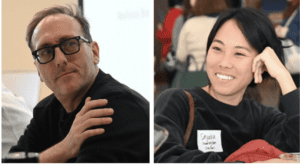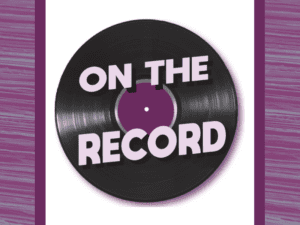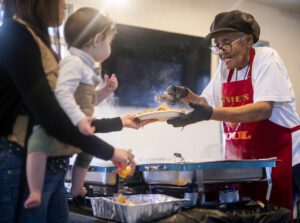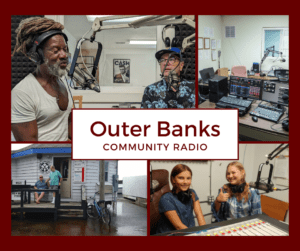By Eric Frederick, NC Local Newsletter Editor
Triad City Beat, a 9-year-old free news source based in Greensboro, is broadening its mission — while holding tight to its sensibilities as a feisty urban alt-weekly.
TCB, which appears weekly in print and regularly updates its reporting online, is working toward becoming a daily news source, with deep reporting on public policymaking and its effects on people and communities. Brian Clarey, the publisher and executive editor, and Managing Editor Sayaka Matsuoka last year secured a grant from the NC Local News Lab Fund and used it to hire Gale Melcher as their first City Beat reporter. Melcher’s job is covering public policymaking and its effects in Greensboro and Winston-Salem.


But TCB’s core mission is intact — delivering stories and opinion pieces that engage with communities, highlight systemic inequalities, hold power accountable and inform readers about culture in the Triad.
TCB was founded in 2014 by three YES! Weekly colleagues: Clarey, who recently signed off his regular column to focus on “higher functions, like making sure everyone gets paid”; Jordan Green, who now covers right-wing extremism for Raw Story; and Eric Ginsburg, now an independent journalist and food writer.
Matsuoka was an intern in the altweekly’s infancy. She then wrote for INDY Week and other publications from 2015 to 2019 before returning to TCB five years ago.
I had a lively chat on Zoom with Clarey and Matsuoka about TCB’s evolution and its future, about alt-weeklies and legacy outlets, about reporting philosophy and about the state of local news. Here’s our conversation, lightly edited for length and clarity:
EF: You’re in the middle of an evolution these days. Talk about that.
BC: Well, I’ve been in this market for 20 years. And I’ve just noticed this very solid and steady deterioration of our daily news properties ever since BH Media bought the News and Record and the Winston-Salem Journal (in 2013) and then lifted them over to Lee Enterprises (which began managing them in 2018 and bought them outright in 2020). I used to work at the News and Record; I was a freelancer there for, like, four years, and you used to never even be able to get a parking spot over there. And now the building is derelict. We used to print the paper there, and now we have to print over at the Journal. I’d say there are fewer than 10 reporters between both papers to handle the third and fifth largest cities in the state.
We’re an alt-weekly. I’ve been working with alt-weeklies since, like, ‘94. But it’s starting to fall on us to do more traditional news coverage because it’s just not happening around here. And it started off with the grant we got from the NC Local News Lab Fund to hire a reporter to cover just city council in Greensboro and Winston Salem, and turn out three to five stories a week. It’s an underpaid position, but it’s awesome experience for a young reporter, and we got somebody really great, Gale Melcher https://triad-city-beat.com/qa-with-gale-melcher-tcbs-first-city-beat-reporter/ . Her grandmother was a reporter, so she’s really feeling the gig.
EF: Sayaka, as managing editor, where do you see TCB going?
SM: We’ve been talking a lot about our role here … In the beginning we were able to be more of this boutique, weekly operation. But these days we really see ourselves — and we’ve been talking about this, and this is why we joined Table Stakes — we’re trying to get to a point where we can become more of a daily operation, because the News and Record is just absent. We’re making do with what we have — it’s me, Brian and Gale, basically, who are the only writers, and basically just me and Gale who are the only reporters, and I do a little more investigative stuff that takes several weeks, and she’s doing things that she can turn around in a couple of days to a week. We’re trying to fill that gap.
We see that so much of the news that previously was being covered by the News and Record is stuff that we’re picking up. The Winston-Salem Journal, I think, is a little better. And oftentimes when I look at the News and Record in print, a lot of the bylines are by Journal reporters … because they don’t have enough content. We’re just trying to fill that gap and also become sort of the first stop for news here, but also building on our own tradition of being more progressive — I don’t know if that’s the right word, but you know, having a stance in some ways.
That’s where we see ourselves. And the conversation that we’re having is: If we want to become the first local daily news source, how can we do that but also stay true to our vision and our morals and our values as a quote-unquote progressive news outlet if we still want to draw in people from across the political spectrum?
EF: So I was going to ask you that. Does your reputation get in the way when you’re trying to broaden your scope?
BC: First off, I must note that reality has a well-known progressive bias. And what this means is, we are just not doing the view from nowhere. We’re not giving equal weight to a ridiculous argument, and we’re trying to ground everything in fact. It’s pretty old-fashioned reporting. We’re not reinventing the wheel. But you know, if someone says something, we’re gonna check it out. And, yeah, we’re progressive in that we don’t only interview white people, and we write stories that everyone in our cities can relate to or identify with. Our cities are 40% Black. Greensboro, since I’ve lived here, has become incredibly multicultural. We have, I think, the second-largest Montagnard population in the world here. We have a lot of folks from West Africa and some Arab nations … (But) there’s sort of this old fashioned mode of journalism in Greensboro that is only writing about a certain segment of the population. And we don’t do that.
SM: And I’ll say, I think there are some stories that really do cover all the bases in terms of the political spectrum. I am subscribed to, and a part of, a lot of Republican groups on Facebook too, just because I like to see what they’re talking about and what’s going on. We did a story about how the Winston-Salem City Council wanted to change the time of their council meetings and committee meetings up an hour, and the community said, overwhelmingly, that they didn’t want that. But the City Council went ahead and did it anyway. So that was a story that I did post across different political groups, like the Republican group, and that got traction there as well. Because it’s not really a progressive thing to hold government entities accountable. I think that’s something that everybody wants, right? So we are doing stories that people from both sides can appreciate. And I think that for a long time, we were seen as sort of the opposite of The Rhino Times (a right-leaning online news source in Guilford County). But I really feel like we’re trying to grow outside of being pigeonholed…
The Overton window will change over time, right? Fifty, 60 years ago, news outlets were reporting from a certain perspective about the civil rights movement, and they were like, these people think that people shouldn’t eat at the counters, and these people, the Black people, say they want to eat at the counters, and they gave that equal weight. And now, of course, 60 years later, we know that was just wrong. It’s morally wrong to not allow Black people and white people to sit at the same counter. So to me, you know, we’re in another civil rights movement now in 2023, and 60 years from now I want to be able to look back at my reporting and say, hey, you know what, we were on the right side of that — morally, it was the right thing to do. And whether it’s a political talking point or not is sort of outside of the question. Whether or not people are like, oh, this is political, this is political — things become political, but that doesn’t mean that they’re not right. So that’s the point from which we try to report.
BC: I have something I’d love to add to this. You know, for an alt-weekly, our point of view has become mainstream. The way we did journalism for all these years has become mainstream. We don’t call protesters rioters, for example. We don’t take the words of a police incident report as gospel — you know, now we know that when you’re looking at a police incident report, it’s almost definitely not what happened, statistically speaking. So I think a lot of the ways that the alternative press has done things are becoming mainstream. A lot of folks are looking to us to modernize their newsrooms.
SM: It’s true. And that’s something that we saw in Table Stakes, too. We joined because we need funding, right? We don’t really have an issue of diversifying our readership, necessarily, or diversifying our writers. But we saw a lot of other news outlets that are there … legacy papers or larger papers that have that issue, and that’s why they’re there — to make inroads with the community and to become more diverse and really report on the communities that they’re embedded in. I don’t think we really have that problem, and I’m proud of that, you know? Yeah, I think people are trying to do more of the journalism that alt-weeklies have been known for.
EF: Sayaka, you’re the first journalist I’ve ever interviewed who used the term “Overton window.” So congratulations. You mentioned wanting to be the primary daily news source in the Triad. What are the biggest hurdles you have to overcome to get there?
SM: Staffing! And funding! I mean, we just have the one reporter right now… And Gale is dynamite. She is a newly graduated person. She went to school for journalism, and we got her right after she graduated, but even as someone who is just out of J-school and has never had a reporting job, she’s doing a great job… But we always talk about, what could we accomplish if we had three Gales, you know? I think it would be incredible.
Brian, did you want to talk about our vision for the next level, for county?
BC: Yeah, I’m going to try to replicate this on the county level. I’m waiting till we get a few more miles on the road with Gale, and then I’m going to apply for another grant and have someone cover every single county commission meeting, and do three to five stories a week on the things that happen there.
I think it’s important to talk about how we do that coverage. In the way I like to edit stories, and Sayaka, we prefer to have most of our conversations on the front end, about what’s happening and how to report it. And something we say all the time is that we are not stenographers. Just going to the council meeting and recording what people say is not a story. You’ve got to go out and expend a little shoe leather. Which is why I think that piece about the pallet homes blew up — one of Gale’s first stories went absolutely cosmic on our website. It was the busiest week we’ve ever had, largely on the strength of City Beat stories. There was a Winston-Salem one about traffic cameras, too.
So they’ve been talking about these pallet homes for a while. These are temporary homes built from pallets for homeless folk in our community. Gale went out there, and talked to the people living in them, and compared what was actually available with the promises that were made. This is just journalism. It’s not a new kind of journalism. But I find that people don’t do this anymore. The meeting is only half the story. Who’s affected by the decisions that get made there is what makes it real.
SM: We did a story when the City Council first passed that funding for the pallet homes, and then other people did stories … and the dailies did stories when the pallets first went up, saying they’re up. And we said, OK they’re up, but so what? They’re supposed to have food on site, showers and things like that. So we sent Gale out there to take a look, and that’s the story she wrote, saying this is what was promised and this is what it’s like, and it nearly broke our site. It was crazy. The numbers were astronomical. And the numbers have since died down, but we’re still following the story … And again, I don’t know that the daily has the resources to follow up and do that. I think they could, but they have to pick and choose between this and whatever event that the mayor is speaking at. So that’s where we also find ourselves, filling the gap (in) being able to follow these stories that maybe the daily doesn’t have the resources or time to do.
BC: I talk a lot about zone defense in journalism these days, particularly as it applies to the state of North Carolina. And I came up with this concept years ago when I just noticed that we had such limited resources that if somebody had a handle on a story at one of the other outlets — like when Joe Killian used to work at the News and Record, if Killian was on it, we didn’t have to cover it — and that allowed us to go find something else. We’re just not interested in replicating, and I think a lot of other outlets have come around on that philosophy, too.
EF: It’s almost jarring when you say the News and Record doesn’t have the resources, because you are sitting there with one reporter. So it’s a matter of priorities, right? Talk more about that.
SM: Yeah, well, it’s different, right? Because they’re the daily paper of record, so to an extent they do have to go to all of these events — like if Boom Supersonic has a press conference, they have to send someone because that’s a lot of money coming into the community. They have the school board, they have everything to cover. So I do feel for the reporters. They’re doing the job that once dozens of reporters were doing.
BC: So that was the point of the grant, too. Everything that Gale produces is allowed to be republished for free by anybody who wants to, and I thought that would help them with their allocation of resources. We don’t have any takers yet. (Laughs.)
EF: Sayaka, since you were talking about content sharing — you guys run a lot of stuff from nonprofits in the state. What’s your philosophy on that? What sort of content are you looking for?
SM: That’s something that Brian actually pushed us to do, and it kind of goes in line with our plan to become a daily news source, and of course we credit all of these. But we just don’t have the resources to put something up on the website every day and have enough content to drive readers to our site. But my hope is also to develop partnerships and relationships with these nonprofits to say … you guys are doing your thing, we’re doing our thing, but where’s the intersection in which we can work together? We want to be that daily news source, and we also want to make these great stories accessible to other people… You’ve written a lot about that in the newsletter as well — collaborative journalism and how news organizations can and need to work together in order to survive. So I think it’s a little bit of selfish reasons for us, to drive more people to the site, stay, find out more about us, but also to show people that there’s also this other great work out there.
EF: As Sayaka was saying, Brian, you need money. I know you have advertising, philanthropy, a little bit of readership support. Talk about that.
BC: Yeah, I use the Blue Lena tech stack, which is the group out of Cary. I took them on right at the beginning of the pandemic, in March 2020. They were incredibly helpful for focusing our reader revenue program. I just did an impact report not too long ago, (and) reader revenue was able to pay for all of our freelancers and for Blue Lena, which is our email newsletter software. Newsletters are another source of revenue. We’re really leaning on those. Dedicated emails are going really well. I’m doing a lot with sponsored content …
You know, nobody wants to buy a display ad anymore; everybody wants something special, a bespoke piece of content. So I’m fine. That used to be such a taboo thing. You know, I’ve been around a long time. You know how people used to talk about sponsored content, or ads on the front page. People went nuts over that. It’s a different deal now …
EF: Have you thought about not printing?
BC: (Laughs.) I just saw my invoice from BH Media I’ve got to pay off, and it did actually go through my head. But if we’re going to be — and this is where I’m thinking today, and I’m telling you this could change at any moment — if we’re going to be the daily news source for the Triad, I believe that a vibrant website and a weekly print product is the vehicle to do it in. Once you start removing that, going down to two print (days) a month, you know, you’re practically a monthly. I don’t think it’s enough. I’ve definitely thought about it — it would save us a ton of money. It would save us a ton on a designer. But I still look at the print as an opportunity to make money even though we’re not selling as much print advertising as we used to. The digital stuff is helping to pay for it. So that’s why we’re leaning into that sponsored content. I’m hesitant to cut back on the print schedule.
SM: We did stop printing for a few weeks during the pandemic, and that’s the point at which we also sort of changed our model. Our deadlines were different then because it was a little bit more flexible … we were digital first. Now we still follow that model. If there’s a story that lands, especially if it’s news, we put that on the website first and then it will go in print.
BC: It changed the way I thought about print a lot. I remember, it was like, what are we going to do without print? And then I started doing the math and I was like, oh my god, I can cover these costs with like, 10 clients, you know? This has become all of a sudden incredibly manageable. But so many folks read us in print. All sorts of folks. In Winston-Salem we have two boxes at the bus stop downtown, and that’s one of our most popular drops. And I think the young people kind of like print too. It’s analog. It’s like listening to vinyl.
EF: Anything else you’d like to say?
SM: Well, we just celebrated our nine-year anniversary. And I guess we’re still happy to be here. I haven’t been here the entire time; I was an intern towards the beginning and then left and came back. But yeah, it’s kind of amazing that we’re still here. Obviously we’d all like to make more money. But I think at this point it’s hard to imagine us not being here, because of the decline of the area papers. It’s sort of appalling to think what would happen. … So we just have to keep doing it.
BC: I’ll add that I actually do feel the weight of this responsibility. I’ve been doing this a long time. I wouldn’t mind doing something else at some point, but this still needs doing, more so than ever. And I talk about this with the staff all the time: If we weren’t doing this, I’m pretty sure that no one else would. And if I weren’t here to make this thing go … talk about being a publisher, what a joke. You know, I’m the publisher because nobody else wants to do this. And I don’t know how many other people are in that position, that they’re in charge just because nobody else wants to do it. It wasn’t my dream to have my own paper. This happened because it needed to happen. I’m here because I need to be here. And I think Sayaka feels the same way.




